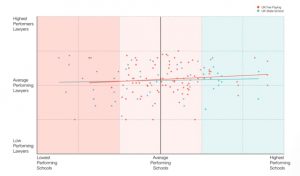Getting into Oxbridge is evidence of a lot of hard work and ability. We all say ‘Fantastic, well done, that’s great news!’ But maybe it’s time to tone down the congrats, given what the data is telling us? Adam McCulloch examines the relationship between educational elitism and professional performance.
People analytics is teaching us that making assumptions about performance at work on grand achievements in education are unreliable. Being able to translate Shakespeare into ancient Greek may make you an amazing scholar, but it’s not an accurate guide to how you might perform in business.
Competitive advantage for business is a lot to do with talent and attracting the most suitable skills to meet specific business goals on board. And getting them to hang around. For many, the assumption is that this means Oxbridge, St Andrews, Durham, Eton, Harrow, Westminster School and so on… institutions recognised all over the world. Reputation, status, cachet – these are important words in the business world, as in politics and academia. “She got a first at Cambridge.” Who could fail to be impressed?
Lopsided intake
In 2021 many aspects of the commercial world bow down to these revered institutions as if it were 1921. The Social Mobility Foundation’s (SMF) Employer Index Report found that 84% of law firms’ graduate intake was Russell Group, despite only 66% of applicants coming from those institutions.
But recruitment based around institutions’ names and reputations doesn’t work. We know it doesn’t work and we have the data that proves it.
And the message is seeping through, even if rather slowly at more traditional firms. Hard data is changing recruitment in professional services and it happens to be promoting social mobility at the same time.
Jason Ku, founder and CEO of data analytics firm Pirical, explains how his firm gives a data-driven view of recruitment processes. In one piece of work for a law firm Pirical took data from its applicant tracking systems and saw that, over five years, 27% of applications came in from fee-paying schools and 36% from state schools. Given only 7% of the UK population is privately educated, such a balance is extremely lopsided.
Worse, after screening out applications deemed to be weaker, the fee-paying proportion jumped up by 8.6% and fell for state schools and international schools. Ku says data showed that screening was the point at which this firm was prioritising fee-paying students.
He decided to look at the application balance for good performing schools vs poorly performing schools. This showed the company was favouring schools with above-average A levels. “But”, says Ku, “you have to ask whether having good A levels means you become a high-performing lawyer. The data revealed there was no such correlation. “If you come from a high performing school or a low performing school there’s no difference,” says Ku.

Outperforming peers
So why are firms creating biases at screening? “We looked at how the student did at the school they went to,” says Ku. So Pirical turned to Department for Education data and analysed postcode, average A levels across schools, locations …
“The answer was there is still no difference,” Ku says.
“The last thing we looked at were the most deprived parts of the country. We found that if you are a student of the bottom 20% of the poorest parts of the country, and then you went to a school where you outperformed your peers, then you are more likely to become a high-performing lawyer.”
To get a law firm to alter its behaviour, Pirical looked at the past impact of its biased recruitment methods.
What Ku found was revelatory. Over five years, 241 applicants from the 20% most deprived areas of the country applied to this law firm., he says. “They threw out 179 applicants – didn’t give them a test or interview at the screening phase.”
And here’s the really fascinating part: “We found 34 of those thrown out were working for direct competitors. Not only this, but we found that half of these ended up at one law firm.”
This indicates, says Ku, there’s one law firm “who understood the predictability of social mobility far better than anyone else and for five years has been handed great candidates on a silver platter. It shows you the benefit of people analytics especially if your competitors are less aware of this.”
So, law firms already digging deep into the data with the aim of improving recruitment and retention have reaped the benefits and competitive advantage while simultaneously promoting societal change, social mobility and their own reputations.
Traditional assumptions
When Lloyd Stephenson left Barclays to become head of resourcing at Ashurst, he landed in a firm that “always had a strong sense of fairness” but still had a traditional view of education and qualifications which meant that the majority of graduate recruits came from Oxbridge and Russell Group universities and fee-paying schools.
Armed with an MSc in Organisational Behaviour and a wealth of experience in recruitment, Stephenson shared the academic research that shows there is little correlation between educational attainment and performance in role. The challenge was to find a recruitment approach that was a better predictor of future performance in role and increase tenure at the firm.
“Given how much time and money we invest in talent, we want them to thrive and stay at the firm … I wanted to find a way of recruiting that would be better at predicting future performance,” he says.
In shifting recruitment away from traditional assumption-based methods, Stephenson worked alongside an occupational psychology firm and tweaked a suite of games that tested logic and reasoning, emotional intelligence and values. With Ashurst being an international firm he wanted to test the new approach in different locations, in this instance Hong Kong and Melbourne. The new tests saved the firm 40% of man-hours in selection and “helped the brand come over as cool” to candidates.
Critically, the logic tests were seen to be a better predictor of technical skills as a lawyer; the emotional intelligence tests were a “much better test of client skills” and team collaboration; and the values test “shows us if someone has close alignment with our values which would make them more likely to accept a job”.
The bias-free tests were later rolled out across Australia and in the UK and now form part of a recruitment approach with much less weight placed on academic performance and partner interviews. Charities and social partnerships have been enrolled to help introduce and prep candidates, alongside recruitment specialists such as Rare and the Bright Network.
“We’re working hard to find the diamonds in the rough – the bright kids from state schools who wouldn’t consider law, or if they do, don’t understand the unwritten laws of corporate life.” Without support, they may “trip up and not fulfil their potential,” says Stephenson.
Data driven
As it is for Ku, data is the foundation for Stephenson. He says: “The tests don’t care where you went to school or how articulate you are over a glass of wine at a dinner party.”
Among Stephenson’s most significant innovations was the introduction of a legal apprenticeship scheme for school leavers. People can join it at 18 and over six years can become a qualified lawyer in England and Wales. “We’re doing outreach in state secondary schools, selling the profession and creating work experience and mentoring opportunities, it’s become a good talent pipeline,” he says.”In our last recruitment drive for our outreach scheme, 100% met the PRIME (a network of law firms striving to improve access to the legal profession through work experience) social mobility criteria and nearly 70% were ethnically diverse.”
Following the introduction of the online tests Ashurst’s graduate intake cohort shifted from being one-third state school to nearly 60% state school, similarly it increased the percentage of people who are the first in family to go to university from 20% to 33% and free school meal beneficiaries from 25% to 33%, and this trend continues with each recruitment cycle.
This progress was recognised by winning recruitment programme of the year in the Social Mobility Awards 2020. In addition to an improvement in social mobility outcomes, the data-driven approach has also benefited ethnic diversity with 40-45% of the firm’s graduate intake having been from ethnic minority backgrounds in the last three rounds.
Stephenson says Ashurst has not used targets so far; instead it looked at systemic bias and reworked its end-to-end recruitment process.
But there is still work to do, he says, in terms of career opportunities: “Lawyers from ethnic minorities take longer to get promoted and often leave the profession because they can’t see the way forward.”
Stephenson and Ku both warn that the issues of diversity and inclusion and social mobility should not be muddled up. “They are completely different,” warns Ku, with race and diversity forming only one barrier; family background, educational inequality, gender, class, disabilities, geography and income being among the others.
Stephenson adds: “It’s easy to equate social mobility with ethnic diversity but there are black and Asian middle classes in the UK with the same expectations about university and professional careers,” and so you need to be thoughtful and agile in how you approach this. Similarly, in Australia, Ashurst’s efforts to attract more diverse candidates differs with first nation candidates compared with candidates from south-east Asian backgrounds.
Pandemic pressure
Ashurst’s efforts to attract more diverse candidates differs with first nation candidates compared with candidates from south-east Asian backgrounds.
Covid, he adds, has heightened social inequality. The more affluent have access to fast broadband which facilitates schooling, jobs and incomes substantially. “Some student candidates are going to find it hard to make up lost ground after Covid and this will impact how they perform in a recruitment process. We know that because of the pandemic, there are some people who will not make it through our recruitment process.”
The geographical aspect of social mobility plays a major role here, says Ku. “You need access, which you don’t have in socially deprived areas with poor transport and digital infrastructure.”
The SMF underlines how Covid could set back social mobility. Although there was in 2020-21 a positive increase in employers creating workplaces that promote equity between individuals from different class backgrounds, the lack of outreach, work experience and mentoring activity at social mobility “cold spots” over the past year will cause problems. These “cold spots” were most likely to be adversely affected by the pandemic, says the Index.
Socioeconomic success
A fall in the number of firms offering travel costs and work experience placements was also highlighted, together with a decline in apprenticeships – a vital component in the need to create non-graduate routes into meaningful employment. And university visits by employers on the Index – many of them large professional services firms – still tend to be to Oxbridge.
However, the Index has good news to impart as well. Nearly half (47%) of employers signed up to the Index now analyse their recruitment process to identify where individuals from lower socioeconomic backgrounds fail to progress. This is a six percentage point increase on the 2018 figure. And more employers now analyse their definitions of talent with the introduction of contextualised recruitment, rewarding current skills and future potential over past performance.
Of course, world-recognised institutions such as Oxford and Cambridge and some fee-paying schools offer good education, but what businesses are finding is that cold hard data doesn’t support the status quo and if they want to improve their proposition they better get their stats sorted out.
The fact that this will also benefit social mobility is a beautiful accident, as Stephenson says in relation to his policies at Ashurst: “We started this journey to ensure that we hired the best performers and through developing better practices it’s great we have started to address social mobility and other biases, and clients are noticing positive outcomes in our work.”











